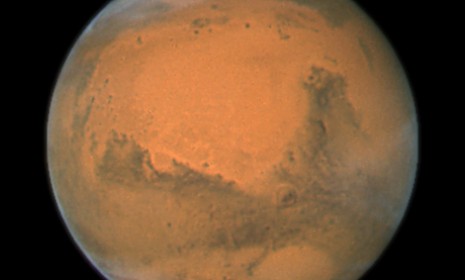Is Mars too dry for life?
Mineral samples suggest the Red Planet has been left hopelessly parched by a "super-drought" millions of years in the making

A free daily email with the biggest news stories of the day – and the best features from TheWeek.com
You are now subscribed
Your newsletter sign-up was successful
The ongoing hunt for martian life is looking less bright. New soil analysis of the Red Planet finds it to be experiencing a 600-million-year long "super-drought," painting a portrait of a dry and lifeless surface. Time to refocus our alien-finding efforts elsewhere? Here's what you should know:
How do we know Mars is so dry?
A team from the Imperial College in London spent three years analyzing soil samples collected during NASA's 2008 Phoenix mission. The scientists wanted to find out how long it had been since the minerals made contact with water. "We found that even though there is an abundance of ice, Mars has been experiencing a super-drought that may well have lasted hundreds of millions of years," study lead author Dr. Tom Pike tells The State Column. "We think the Mars we know today contrasts sharply with its earlier history, which had warmer and wetter periods and which may have been more suited to life."
The Week
Escape your echo chamber. Get the facts behind the news, plus analysis from multiple perspectives.

Sign up for The Week's Free Newsletters
From our morning news briefing to a weekly Good News Newsletter, get the best of The Week delivered directly to your inbox.
From our morning news briefing to a weekly Good News Newsletter, get the best of The Week delivered directly to your inbox.
Why is the possibility of life so dismal now?
Well, even though there was once water on the surface, the soil samples suggests it was only there for about 5,000 years, says Alex Knapp at Forbes — a very short timeframe. "That means it's relatively unlikely that life had a chance to evolve." (It took millions of years for multi-cellular life to evolve on Earth.) This study also proves that this dry soil is uniform across the planet, says Nick Collins at Britain's Telegraph; in fact, Mars formed "under similarly arid conditions to the Moon" — another celestial body famously devoid of life.
So is hope of martian life lost for good?
Not entirely. There's still hope — at least underground. "After all, it's clear from the presence of gypsum [a mineral that requires water to form] on Mars that water has flowed there, both on the surface and most likely underground, too," says Knapp. "It's not hard to imagine that there are at least microbes of some sort living on Mars. But I imagine it will be quite a few decades before we find out for certain."
A free daily email with the biggest news stories of the day – and the best features from TheWeek.com
Sources: Forbes, State Column, Telegraph, TG Daily
-
 Political cartoons for February 21
Political cartoons for February 21Cartoons Saturday’s political cartoons include consequences, secrets, and more
-
 Crisis in Cuba: a ‘golden opportunity’ for Washington?
Crisis in Cuba: a ‘golden opportunity’ for Washington?Talking Point The Trump administration is applying the pressure, and with Latin America swinging to the right, Havana is becoming more ‘politically isolated’
-
 5 thoroughly redacted cartoons about Pam Bondi protecting predators
5 thoroughly redacted cartoons about Pam Bondi protecting predatorsCartoons Artists take on the real victim, types of protection, and more